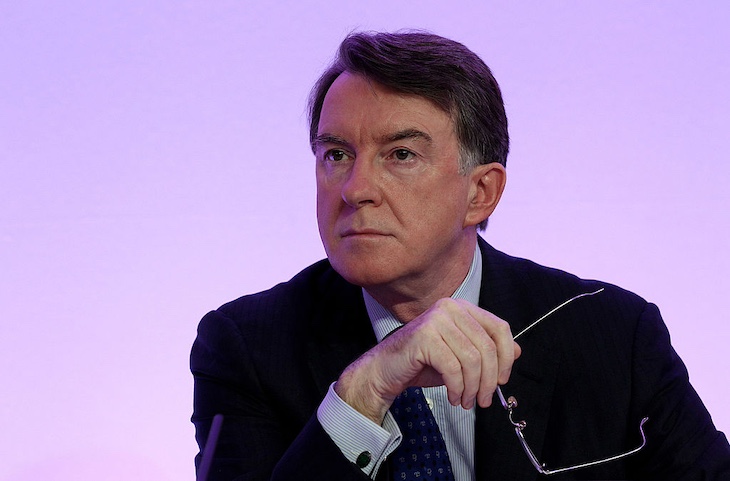Is Lord Mandelson being ‘lined up’ as the UK’s next ambassador in Washington? The news that the Labour party’s arch-Blairite and one-time spin-doctor extraordinaire may be in the running for what is seen as the UK’s top diplomatic job has generated an immediate and impassioned reaction, much of it hostile. Some of this is because Mandelson is viewed as the epitome of New Labour. While others are concerned by the political and personal baggage Mandelson would inevitably bring with him.
Some of the very qualities that made him so successful in the UK and in Europe had the opposite effect in the US
Now it cannot be excluded that this is no more than a kite-flying exercise on the part of No. 10, designed to gauge the reaction at home and abroad, and to judge how far the negatives might outweigh the positives. On Wednesday, Mandelson appeared to distance himself from the rumours, briefing the Times that he has not put himself forward nor discussed the position with No. 10 or the Foreign Office. That, however, is not a denial that he would take up the job if offered.
On the asset side, Mandelson has a voluminous contact book. His global experience has accumulated over many years, not only as a politician but as a businessman, and he clearly is able to consort with the rich and powerful. His closeness to the Prime Minister is not a bad thing either, given the crucial nature of the UK-US relationship. But the downsides are also considerable.
There are his two resignations from the Blair government, the one over an undeclared loan for a flat, the other – for which he was absolved of any impropriety by an inquiry – over passports for the Indian businessmen, the Hinduja brothers.
More recently there have been questions – again largely dispelled – over his relations with the late Jeffrey Epstein and the now jailed Ghislaine Maxwell. Latterly it is his dealings with China that have drawn attention, though – like many – he may just have been caught in the sharp UK switch from George Osborne’s ‘golden age’ to the climate of suspicion that set in under Theresa May.
While these may be reputational downsides for Mandelson in the UK, they could loom much larger in the United States where, for all the apparent licence given to Donald Trump as a politician, and for all that ‘pork’ plays such a big role in US politics, ethical considerations tend to take on larger significance. This is one reason why any welcome for Mandelson in DC could be muted – although it has also to be said that a title helps: Americans by and large love a Lord.
If the Democrats win the presidency, of course, there is a chance for Labour to rekindle the personal and ideological closeness that distinguished the Blair-Clinton years. Less so, it might be imagined, should Trump return to the White House, at least in the early stages. But there are two other doubts that might cause problems should Mandelson be the next occupant of the recently restored Lutyens mansion at 3100 Massachusetts Avenue.
The first is the charge of cronyism that will be laid at the door of No. 10 and the trail of disappointed candidates such an appointment would leave in its wake. Of these, the most justified in feeling hard done by would be the UK’s current National Security Adviser and longstanding diplomat, Sir Tim Barrow, who believed that he had been ‘lined up’ for the job several months ago, before learning, after Labour won the election, that the new prime minister wanted to make his own choice.
Another in the frame was thought to be the former Labour foreign secretary, David Miliband, who exiled himself to New York, as head of the International Rescue Committee, after losing the 2010 Labour leadership contest to his younger brother. The current ambassador, Dame Karen Pierce, has also given the impression of not being averse to staying on. Nigel Farage, thought to fancy himself as ambassador to the court of Trump, was probably never in the running.
The second could be resentment in the Foreign Office, and more widely in the Civil Service, at the appointment of an outsider to this coveted job. What, after all, would there be left for the ladder-climbers to aspire to, if it becomes standard practice in the UK, as in the US, for major diplomatic appointments to be in the gift of No. 10? There was a huge outcry in 1977, when James Callaghan appointed his son-in-law, a successful economist and TV journalist, Peter Jay, to Washington.
Personally, I have no particular problem with senior diplomatic, indeed senior civil service, jobs going to outsiders who share the government’s political outlook. Indeed, I would go so far as to argue that there is much to be said for a government machine being more politically attuned to the government of the day. Callaghan, by the way, stuck to his guns and Jay’s tenure was seen, both at the time and in retrospect, in a positive light.
But this is where the greatest misgivings about Peter Mandelson’s mooted appointment to Washington might well lie. Because the one question that has not really been probed is: can he do the job? While Mandelson’s facility for hobnobbing with the rich and famous could certainly serve him well in Washington, and promote the UK’s national interests, the job is also about communicating with Americans – on Capitol Hill and in the country at large.
The United States is a much more demanding environment in this respect than is often appreciated. The old saw about being divided by a common language is not completely wrong. Some of those most at ease in UK politics – David Cameron, for instance – have looked distinctly ill at ease in the United States. Margaret Thatcher appealed not just to Ronald Reagan, but to Americans, as a well-groomed, highly articulate politician who knew her mind and spoke straight. Pierce, the current ambassador, is cut a little from the same cloth. As was Mo Mowlam, a highly successful advocate for the UK in the US during her frequent visits as Northern Ireland Secretary in the run up to the Good Friday Agreement.
She was succeeded in that post by Peter Mandelson, and the difference – I was then based in Washington – was noted at once. Neither what he said nor how he said it went down at all well, which limited his success as an emissary. What is more, some of the very qualities that made him so successful in the UK and in Europe had the opposite effect in the US. There was a suspicion of weasel words, of ultra-smooth manners. There was not much mutual understanding and a distinct lack of trust. ‘Perfidious Albion’ was a watchword once again.
Of course, much has changed since those days, on both sides of the Atlantic, and Mandelson himself has hardly stood still over these dozen or so years. It could be that he and the United States get along a lot better this time around. Then again, it is worth asking whether Mandelson has mastered the art of communicating with Americans, which has to be the key quality required for the job of UK ambassador in Washington. With the announcement not expected until after the US election, there is time enough for the Prime Minister to change his mind.







Comments